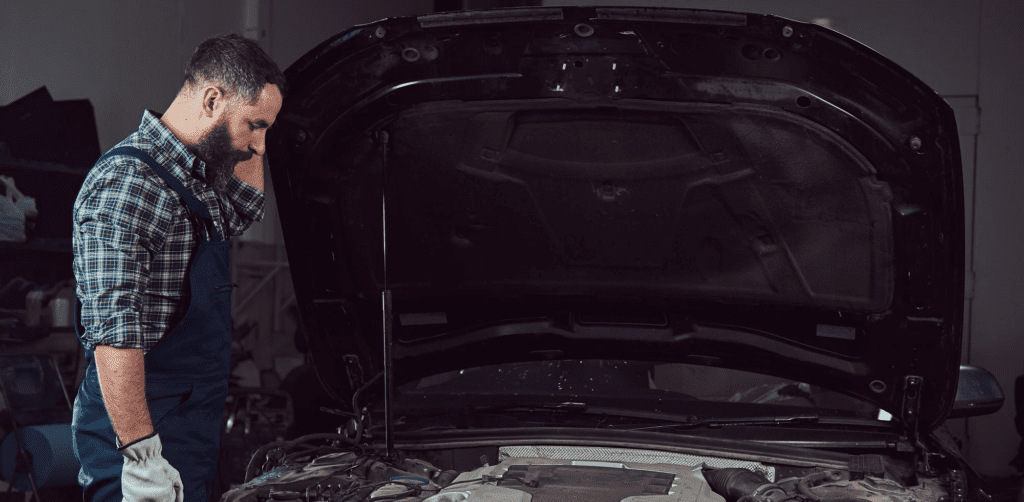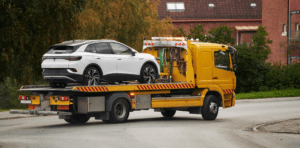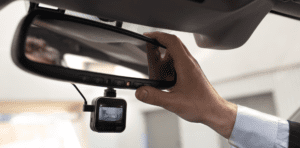Compare cheap car insurance
✔ Compare cheap car insurance quotes
✔ Over 110 insurance providers
✔ Get a quote in minutes
✔ Save up to £504*


If you hear a squeaking noise while driving your car, it may indicate various issues such as a worn-out cambelt or a faulty alternator.
- Why is my car squeaking?
- What should I do if my car is squeaking?
- When is your car squeaking?
- Issues that may cause your car to squeak
- Is it safe to drive a squeaking car?
- How can I prevent my car from squeaking?
- Will a squeaking noise from my car affect my insurance?
In our comprehensive guide on car squeaks, we provide valuable insights to help you identify the potential problems and emphasise the significance of proper vehicle maintenance.
Why is my car squeaking?
When your car emits unusual squeaking and squealing sounds, it’s typically an indication that something is amiss.
While it may be a minor issue that can be easily resolved, it could also serve as an early warning sign of a more significant problem lurking beneath the surface.


As tempting as it may be to simply ignore the noise and hope it magically disappears, it’s crucial to take proactive action instead. Ignoring the issue can potentially exacerbate the problem and lead to more extensive damage.
Therefore, it is strongly advised to promptly seek professional assistance and have your car thoroughly examined and repaired at the earliest opportunity.
By addressing the squeaking issue promptly, you can ensure the longevity and optimal performance of your vehicle.
How much can you save on your car insurance?
What should I do if my car is squeaking?
If your car is squeaking, it’s essential to take a systematic approach to address the issue promptly. Start by paying close attention to the specific circumstances in which the sound occurs.
Note whether it happens during engine start-up, idle moments, acceleration, turns, or when encountering bumps on the road. This information can provide valuable clues for diagnosing the problem.


Once you’ve identified the timing and conditions of the squeaking, it’s advisable to consult a qualified mechanic. Describe the issue in detail to the mechanic, including when and where the sound occurs.
A skilled professional will ideally be able to diagnose the root cause of the problem and proceed with the necessary car repairs before it escalates into a more severe issue.
Regardless of the exact cause behind the squeaking, it’s crucial to take swift action once you notice it. Even seemingly minor problems can escalate and become more serious, leading to potential breakdowns and costly repairs.
By addressing the squeaking promptly, you can mitigate further damage and ensure the long-term reliability of your vehicle. Remember, proactive measures are key to preventing minor issues from turning into major headaches.
How much can you save on your car insurance?
When is your car squeaking?
Identifying the specific circumstances in which your car squeaks can help pinpoint the underlying issue. Here are some common scenarios and their possible causes:
Squeaking when turning the ignition
If you hear a squeaking noise right after turning the ignition, it could indicate a problem with the serpentine belt or pulley system. These components drive crucial systems in your car, and any issues should be addressed promptly to ensure proper functioning.
Squeaky noise while turning the steering wheel
A squealing noise when manoeuvring the steering wheel might signify a problem with the power steering system. It’s crucial to address steering-related issues immediately, as driving with a faulty system can pose safety risks.
Squealing noises while braking
If a noise occurs when you press the brake pedal, it could stem from various parts of the braking system. Worn-out brake pads, which expose the brake discs, may generate a loud noise while causing potential damage to your vehicle. It’s important to have this issue examined and repaired to maintain optimal braking performance.
Squeaking noises on uneven ground
If you notice squeaking noises when driving over uneven surfaces such as potholes, cobbled streets, or during off-roading, it could be related to your car’s suspension. The suspension system is designed to absorb vibrations and shocks from uneven terrain. If the suspension has experienced wear and tear, it can impact its performance and produce unpleasant sounds.
Regardless of the specific scenario, it’s crucial to address squeaking noises promptly. Ignoring them can lead to further damage or compromise safety. Make sure to consult a qualified mechanic or technician who can diagnose the problem accurately and carry out the necessary repairs.
By taking swift action, you can maintain the reliability and longevity of your vehicle.
How much can you save on your car insurance?
Issues that may cause your car to squeak
Here are some common causes of squeaking in cars and suggestions on how to address them:
Worn-out cambelt
If your car squeaks when you press down on the accelerator, a loose or worn-out cambelt may be to blame. Consider having a mechanic inspect it, especially if your car is a few years old. A broken cambelt can lead to costly damage if not addressed promptly.
Steering system issues
Squeaking during turns can indicate problems with the steering system. Check the power steering fluid level and top it up if necessary. If the issue persists, worn-out ball joints or contaminated power steering fluid may be the cause, requiring professional attention. Additionally, inadequate lubrication in the steering system may be resolved by a mechanic.
Faulty brake pad
Squeaking while using the brakes is commonly caused by faulty brake pads. Some brake pads are designed to make noise when they need replacement. Act quickly to avoid damaging the brake rotor discs, which can be more expensive to repair. Squeaking can also result from debris lodged between the pad and disc, which may dislodge on its own or require assistance from a mechanic.
Dodgy alternator
A squeaking noise from the engine could indicate a failing alternator, responsible for charging the car battery and powering various electrical components. Look out for additional signs such as a burning smell or a warning light on the dashboard. If suspected, have the alternator checked by a professional.
Tyre-related issues
Screeching can be a symptom of under-inflated tyres or uneven tread wear. Visit a garage to address these issues. If your tyres are over 10 years old or show signs of damage, consider replacing them. Remember to regularly check your tyre tread depth as it is a legal requirement to maintain a minimum tread depth of 1.6mm.
Suspension problems
Squeaking from the suspension system could indicate significant wear and tear in the springs or shock absorbers. It is advisable to have a qualified mechanic inspect the suspension system for any necessary repairs or replacements. The suspension system plays a vital role in providing a smooth ride by absorbing shocks and vibrations from road irregularities.
Remember, addressing squeaking issues promptly is essential to prevent further damage and ensure the safety and longevity of your vehicle. Consulting with a qualified mechanic can help diagnose the problems accurately and facilitate the necessary repairs.
How much can you save on your car insurance?
Is it safe to drive a squeaking car?
When your car emits squeaking noises, it’s important to assess the situation to determine if it is safe to drive. While some squeaks may be harmless, others can indicate underlying problems that compromise safety. Here are some considerations:
Uncertainty about the cause: If you’re unsure about the exact cause of the squeaking, it’s advisable to have a mechanic diagnose the issue before driving the car. A professional evaluation will provide clarity and ensure any potential safety concerns are addressed.
Brake-related issues: If the squeaking is related to the brakes, it can indicate problems such as worn-out brake pads or issues with the brake system. Driving with faulty brakes can be dangerous and jeopardise your ability to stop the vehicle safely. It is essential to have brake-related problems resolved promptly.
Steering system problems: Squeaking noises originating from the steering system can indicate issues that compromise your ability to control the car effectively. Driving with a faulty steering system can be hazardous and increase the risk of accidents. Seek professional assistance to assess and rectify any steering-related problems.
Other safety concerns: While these are common examples, it’s important to address any squeaks that raise concerns about the safety or integrity of the vehicle. Whether it’s related to the suspension, tyres, engine, or other crucial components, it’s always best to err on the side of caution and have a professional inspect and resolve the issue.
Remember, your safety and the safety of others on the road should always be a top priority.
If you have any doubts about the safety of driving your squeaking car, it is recommended to have it checked by a qualified mechanic to ensure that any necessary repairs are performed before operating the vehicle.
How much can you save on your car insurance?
How can I prevent my car from squeaking?
Preventing your car from squeaking and maintaining its overall health requires regular maintenance and attentiveness. Here are some steps you can take to keep your vehicle in optimal condition:
Conduct routine checks: Regularly inspect and maintain essential aspects of your car, including fuel levels, oil changes, coolant levels, tyre pressure, and electrical components. Topping up fluids as needed ensures proper functioning and helps prevent potential issues.
Scheduled servicing: Follow your car’s recommended servicing schedule, or have it serviced at least once a year. A professional service will thoroughly assess your vehicle’s condition, detect any underlying problems, and ensure that all components are in good working order.
Smooth driving: Adopting a smooth driving style minimises wear and tear on various components. Avoid sudden acceleration, harsh braking, and aggressive manoeuvres. Additionally, whenever possible, try to avoid potholes and rough road conditions, as they can strain your car’s suspension and other parts.
Manage weight: Keeping the weight of your car in check helps prevent excessive strain on tyres, brakes, and suspension. Remove unnecessary items from your vehicle to avoid overloading it, as this can negatively impact performance and put stress on various systems.
Respond to warning lights: Dashboard warning lights should never be ignored. They serve as crucial indicators of potential problems within your car. Whenever a warning light illuminates, address the underlying issue promptly by consulting a qualified mechanic or technician.
By following these preventative measures and being proactive in maintaining your car, you can reduce the likelihood of squeaking issues and ensure that your vehicle operates smoothly and reliably.
Regular maintenance and timely attention to potential problems will help keep your car in excellent condition for years to come.
How much can you save on your car insurance?
Will a squeaking noise from my car affect my insurance?
It’s important to understand how a squeaking noise from your car can potentially impact your insurance cover:
Maintenance as a condition: Most car insurance policies require the insured vehicle to be well-maintained and in a roadworthy condition. This means that properly maintaining your car is not only crucial for safety and longevity but also a contractual obligation you have as a policyholder.
Policy validity and claims: Failure to keep your vehicle well-maintained could potentially invalidate your car insurance policy. In the event of an incident or claim, if it is discovered that the cause or contribution to the issue was a result of insufficient maintenance, your insurer may refuse to pay out on the claim.
Legal implications: Driving a vehicle in a dangerous condition is against the law. If you neglect necessary maintenance and drive a car that poses a safety risk, you can face penalties, fines, and penalty points on your licence. These consequences can not only affect your driving record but can also lead to an increase in your insurance premium.
Maintenance repairs and responsibility: It’s important to note that car insurance policies typically do not cover repairs related to regular maintenance, including fixing a squeaking problem. Addressing and resolving maintenance-related issues, such as a squeaking noise, is the responsibility of the vehicle owner.
By understanding the relationship between maintenance, car insurance, and your legal obligations, you can prioritise the proper upkeep of your vehicle.
Regular maintenance not only ensures your safety and compliance with the law but also helps maintain the validity of your insurance cover and reduces the risk of future issues.










